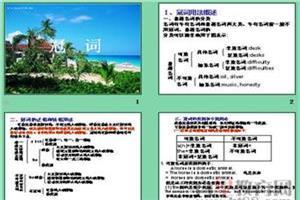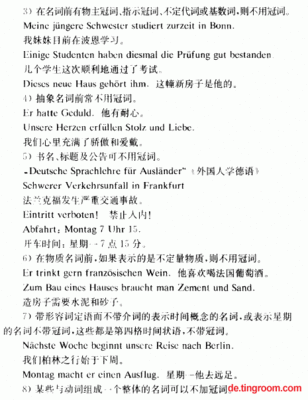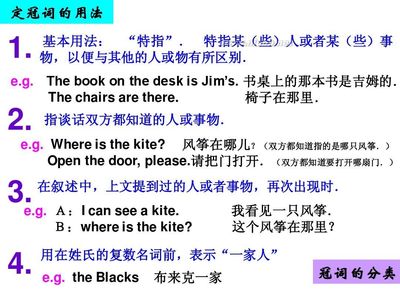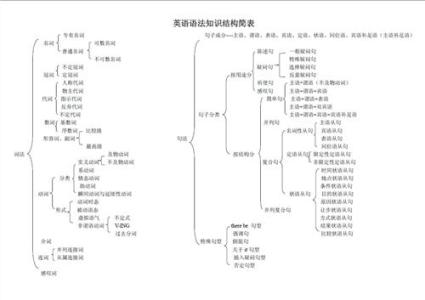冠词本身不能单独使用,也没有词义,它用在名词的前面,帮助指明名词的含义。英语中的冠词有三种,一种是定冠词,另一种是不定冠词,还有一种是零冠词。零冠词是指名词前面没有不定冠词、定冠词,也没有其他限定词的现象,零冠词的用法如下:
考题点击1 If you go by ______ train, you can have quite a comfortable journey, but make sure you get ______ fast one. (05全国卷3)
A.the; the B.不填;a C.the; a D.不填;不填
在由介词by 加表示交通方式的名词短语中,不用冠词。但如果by 不表示交通方式,而表示地理位置,就需要加冠词了。如:by sea 乘船;by the sea 在海边
考题点击2 It is often said that _____ teachers have _____ very easy life. ( 05北京卷)
A. 不填;不填C. the, 不填B. 不填;a D. the, a
teachers 是复数名词,用来表示类属,不加冠词。只有在特定范围内的复数名词前才加冠词。“have a … life”是一个习惯短语,表示“过着… 的生活”。
考题点击3 The warmth of _______ sweater will of course be determined by the sort of ______wool used. (01全国)
A. the; the B. the;/ C. /; the D. /; /
sweater 的保暖性能取决于使用哪一种类型的羊毛。the 加单数名词sweater 表示一种类型;而羊毛是物质名词,表示类属的物质名词不加冠词。
零冠词的用法1)国名,人名前通常不用定冠词:England,Mary;
2)泛指的复数名词,表示一类人或事物时,可不用定 冠词;They are teachers. 他们是教师。

3)抽象名词表示一般概念时,通常不加冠词;Failure is the mother of success. 失败乃成功之母
4)物质名词表示一般概念时,通常不加冠词,当表示 特定的意思时,需要加定冠词;Man cannot live without water. 人离开水就无法生存。
5)在季节、月份、节日、假日、日期、星期等表示时间的名词之前,不加冠词;We go to school from Monday to Friday. 我们从星期一到星期五都上课。
6)在称呼或表示官衔,职位的名词前不加冠词;The guards took the American to General Lee. 士兵们把这个美国人送到李将军那里。
7)在三餐饭、球类运动和娱乐运动的名称前,不加冠词 如:have breakfast,play chess 但如果三餐饭的名词前有形容词修饰,则需要加冠词。如:have a big breakfast
8)当两个或两个以上名词并用时,常省去冠词;
I can‘t write without pen or pencil. 没有钢笔和铅笔,我就写不了字。
9)当by 与火车等交通工具连用,表示一种方式时,中间无冠词;by bus,by train;
10)有些个体名词不用冠词;如:school,college,prison,market,hospital,bed,table,class,town,church,court 等个体名词,直接置于介词后,表示该名词的深层含义;go to hospital 去医院看病go to the hospital 去医院(并不一定去看病)
11)不用冠词的序数词;a. 序数词前有物主代词b. 序数词作副词He came first in the race. c. 在固定词组中at (the) first, first of all, from first to last
12)在复习过程中注意不带冠词的短语和习惯用语。
13)特别注意加冠词和不加冠词的意义区别。如:go to hospital --- go to the hospital at table --- at the table in charge of --- in the charge of out of question --- out of the question
不定冠词的位置考题点击1 ______ role she played in the film! No wonder she D has won an Oscar. (2002上海春)
A. How interesting C. What interesting B. How an interesting D. What an interesting
不定冠词常位于名词或名词修饰语前。但位于下列形容词之后:such,what,many,half,如:I have never seen such an animal. Many a man is fit for the job.
考题点击2 We were in ________ when we left that we forgot the airline tickets. (2003上海)
A. a rush so anxious C. so an anxious rush B. a such anxious rush D. such an anxious rush
当名词前的形容词被副词as, so, too, how, however, enough修饰时,不定冠词应放在形容词之后:It is as pleasant a day as I have ever spent. So short
a time. Too long a distance.
还需注意下面三个问题:1、quite,rather与单数名词连用,冠词放在其后。但当rather,quite 前仍有形容词,不定冠词放其前后均可。如:quite a lot
2、在as,though 引导的让步状语从句中,当标语为形容词修饰的名词时,不定冠词放形容词后:Brave a man though he is,he trembles at the sight of snakes. 他尽管勇敢,可见到蛇还是发抖。
3、当名词被比较级形容词修饰时,不定冠词通常置于比较级形容词之后。
定冠词的位置考题点击1 考题点击He did it ____ it took me. (2003北京)
A.one-third a time B. one-third time C. the one-third time D. one-third the
time 定冠词通常位于名词或名词修饰语前,但放在all,both,double,half,twice,three times等词之后,名词之前。
All the students in the class went out. 班里的所有学生都出去了。
 爱华网
爱华网



